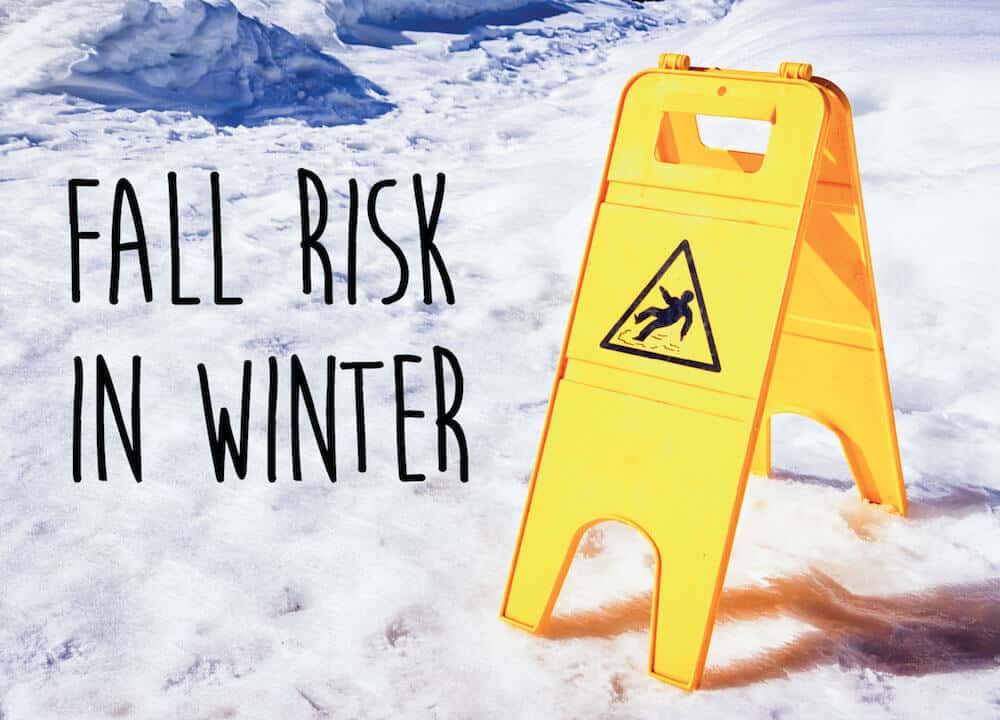As people age, their chances of falling significantly increase. The U.S. Centers for Disease Control and Prevention described that 1 in 3 adults over 65 years old falls every year. While many factors contribute to an increased risk of experiencing an incident, winter conditions like ice and snow make it more likely that elders will fall if they aren’t applying caution.
You shouldn’t feel like you can’t go outside in the winter from fear of falling, it is important that you understand how to reduce your risk of falls. Everything from the shoes you wear to how well you prepare your house can contribute to how likely you are to slip or trip this winter.
Know the facts
- One out of five falls causes a serious injury such as broken bones or a head injury. (CDC)
- Each year, 2.8 million older people are treated in emergency departments for fall injuries. (CDC)
- Over 800,000 patients a year are hospitalized because of a fall injury, most often because of a head injury or hip fracture. (CDC)
- Falls are the most common cause of traumatic brain injuries. (CDC)
What Puts You at Risk
- Lower body weakness
- Vitamin D deficiency
- Difficulties walking or balance issues
- The use of sedatives, antidepressants, and narcotics
- Poor vision
- Foot pain or poor footwear
- Broken Steps or rails
You never know when bad weather will strike, or when you will get caught up in an accident. Most falls happen by a combination of risk factors. Spending time outdoors can predispose you to a greater chance of falling.
The following are tips and tricks to help keep you safe this winter. It is significant to dress for the occasion.
When going outside during the cold seasons it is important to wear the following:
- A tightly woven, preferably wind-resistant coat or jacket
- Mittens
- Hats
- Proper boots. A deep tread sole made specifically for winter are best, sneakers, heels and flats can be very slick.
- Always keep cat litter, sand, or salt for ice patches.
- It is important to always carry a cell phone or alert someone to your whereabouts and expected time to return.
Sometimes accidents happen, no matter how thoroughly you prepare and how careful you are.
When they do happen
- Take several deep breaths to gather your thoughts.
- Remain still on the floor and assess for any pain or trauma.
- If you think you are unharmed and can safely rise to your feet, do so but with caution.
- If you are experiencing pain, especially in the head, neck, or back, call for help and remain still on the ground.
- Carrying a portable phone or carrying an emergency response device is recommended here in the Northwoods.
- If you fall, it is essential to tell your doctor and family to initiate measures to prevent future falls.
During these winter months it is vital to maintain your property by clearing sidewalks and preventing ice. Stay healthy and fit to ensure strength and mobility. Be aware of the forecast and stay up to date about dangerous storms. Stay warm and safe this winter!
For more information on how to prevent unexpected falls this winter, contact Leah Littleton, CHR or Melanie Tatge, PH Educator, in the Community Health Department or call (715) 478-4355 or visit our webpage at cmh.fcpotawatomi.com
Sources
Vellas BJ, Wayne SJ, Romero LJ, Baumgartner RN, Garry PJ. Fear of falling and restriction of mobility in elderly fallers. Age and Ageing 1997;26:189–193. Accessed on November 30, 2016.
Centers for Disease Control and Prevention, National Center for Injury Prevention and Control. Web–based Injury Statistics Query and Reporting System (WISQARS). Accessed November 30, 2016.


